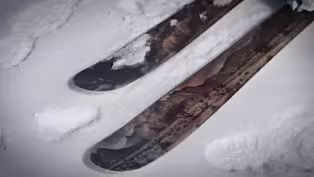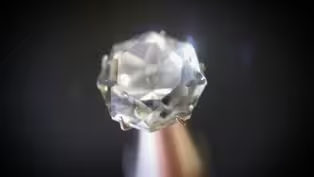Oregon Field Guide
Siletz Surf
Clip: Season 34 Episode 8 | 8m 48sVideo has Closed Captions
A surf camp for tribal members along the Oregon coast.
There is little Indigenous representation in the surfing communities situated in and around Oregon's Indigenous ancestral lands. The Siletz Warrior surf camp is a chance to learn surfing and build power and positionality to become influential stewards of the land.
Problems playing video? | Closed Captioning Feedback
Problems playing video? | Closed Captioning Feedback
Oregon Field Guide is a local public television program presented by OPB
Oregon Field Guide
Siletz Surf
Clip: Season 34 Episode 8 | 8m 48sVideo has Closed Captions
There is little Indigenous representation in the surfing communities situated in and around Oregon's Indigenous ancestral lands. The Siletz Warrior surf camp is a chance to learn surfing and build power and positionality to become influential stewards of the land.
Problems playing video? | Closed Captioning Feedback
How to Watch Oregon Field Guide
Oregon Field Guide is available to stream on pbs.org and the free PBS App, available on iPhone, Apple TV, Android TV, Android smartphones, Amazon Fire TV, Amazon Fire Tablet, Roku, Samsung Smart TV, and Vizio.
Providing Support for PBS.org
Learn Moreabout PBS online sponsorship(waves gently crashing) - [Narrator] Surfing is a popular sport in Oregon.
Every year surfers brave the frigid waters to take advantage of the abundant beach breaks and diverse waves.
However, there's a noticeable lack of diversity in Oregon surfing communities, which are often situated in and around indigenous ancestral lands and coastlines.
Kelly Potts is seeking to change that by offering free surfing clinics to tribal members.
- Not only are we gonna teach you how to get up to your feet, we're gonna teach you how to get back down to your board.
I call it finishing like a pro.
Hair's still dry.
- [Narrator] One of those members is Kimberly Lane, who saw Kelly's surfing clinics as a great opportunity for fellow members of the Siletz tribe.
- For me, when I think of the benefit that I want to bring to the tribe with this partnership with all our we, is just that same empowerment, connection, healing.
- [Kelly] You're doing it.
- Oregon is Indian country.
This is part of our, you know, original reservation.
And so it's full circle for us in terms of healing and empowerment and getting opportunities we don't normally get.
- My name's Kelly Potts and I'm from Maui, Hawaii.
I was born in Portland, Oregon.
My dad was an old surfer from Houston and he would just take us out to the coast while he was surfing and I would just play in the water and in the estuaries.
So I have a lot of memories growing up here in the Northwest.
I remember the first day he got me out on a board and he was like, "All we're doing today is learning how to paddle.
We're not even gonna catch a wave."
(laughs) I think it was like on the second day we got to catch waves, but he wouldn't let me stand up.
And then the third day he got me standing up and then after that he was like, "You're on your own kid.
I gotta get back to work."
(laughs).
So being raised in Hawaii I learned a lot about looking out for a need and not just recognize it, but to be there to do something to help out.
And I said, "You know what I'm gonna need to do?
I'm gonna need to take a road trip, and I'm gonna need to see what are the good places that are conducive for teaching surfing."
It was when I got into that Northwest territory that I started to recognize all the indigenous communities out here that are near the coast.
And it really was very obvious who I would wanna host my retreats for.
- Good morning, darling.
- Good morning.
You can push it back in, I'm sorry.
I was thinking about the fin setup.
- Great.
- Hi.
- Nice to see you.
Thanks so much for coming.
- I love the ocean.
- Yeah I like the waves and the ocean.
- [Student] I'm terrified of the ocean.
- And we did it like a couple years ago with our auntie and just kinda wanted to do it again.
- [Kelly] Okay cool, well let's get you going, ladies, let's get you suited up.
- [Narrator] Lexi and Navaeh have been taking lessons with Kelly for several years.
Whereas this will be Kendall and Bianca's second time surfing with Kelly.
All four girls are tribal members.
- [Instructor] Good, and this helps to keep the board sticky so that you don't fall off.
- [Kelly] I've got a group of volunteers that have been helping out with a lot of the different events throughout the years.
- [Volunteer] Ooh, looks beautiful out there.
- And I feel like they want that connection with the communities that have been around them all along, but never had the chance or the opportunity to get to know.
Okay, what's the most important thing in surfing do you think?
- [Kendall] Not drowning.
- Not drowning, let's be safe, right?
Safety first.
- [Navaeh] I said fun.
- What is the source of energy that waves come from?
The bottom has something to do with it.
Sand has something to do with it.
Yes, Nevaeh wind.
Yeah.
You get to ride the wave from a heartbeat of a storm that's traveled from that far away.
So I see little baby paddles happening right here.
So go ahead and flick that sand behind you.
Just flick that sand.
I think what has built trust is knowing that I've been instructing for 20 plus years, you know, I have ocean rescue skills and I think that gives them a little more comfort knowing that they're in good hands.
Body, sideways.
Get that back foot.
Stand up and point.
There you go.
Stay low, bend those knees.
Good, looks good, all right.
When the participants show up, they're usually full of nerves and anxiety and they're very apprehensive.
- (whimpers) I'm gonna hold this.
- And then I just see that after their first wave and their second that they just open up and they're recognizing their own ability.
- Kelly will like go, like she'll pull you out and go with you like one on one.
- [Kelly] Yeah, Navaeh, eyes up.
Awesome.
Nice job girlfriend.
Nice job.
- [Navaeh] She'll like get you out of your comfort zone.
- [Kelly] All right, out and around.
- At first it feels scary 'cause you feel like, like it's gonna go like this.
Kind of scary but kind of fun.
It definitely feels joyful because once you get on and like know what you're doing, it's really fun and you get way better.
- And we have the wetsuits and booties.
Only our hands really feel how cold it is.
They keep us warm.
- I can see their confidence build each wave they catch.
That right there is the most empowering thing for me to witness, knowing that they just experienced something that they didn't think that they were capable of doing.
And by the end they were really good at it.
(laughs) A lot of these kids are really, really good at it.
Oh, this is a good one.
- [Instructor] You guys both want to go?
Ready, okay.
- [Kelly] Yeah, girls.
- All the smiles in the water are so much like brighter than smiles on land.
And I saw such an amazing improvement from yesterday to today.
- I think there is a lot of barriers that would keep these families from wanting to get into the surf world.
It's kind of a white man's sport.
It didn't use to be, I don't think, you know, Hawaii is renowned for being like one of the first places in the world to be recognized for surfing.
A lot of Indigenous communities across the world used to surf, I think a lot of people had canoes that they would be catching waves in, you know.
So yeah, I could see that that would be one barrier, not recognizing your own people out in the water.
And also just access to equipment.
Having to put on a wetsuit and the cold water.
So we're able to make it easier for them to get out in the water more.
- [Instructor] Isn't that a great way to end?
- This surfing experience is not just about addressing that hierarchy of needs, it's about addressing the needs of connection and that feeling of community, but also healing and empowerment.
We all need that.
(group clapping) - [Kelly] I just wanna, uh, congratulate you all 'cause I thought you all ripped super hard.
What are you proud of yourself for today?
- For standing up actually.
- [Kelly] Yes, yes!
- [Kendall] Not drowning.
- [Kelly] Not drowning!
Jellyfish, jellyfish, jellyfish.
- I just kept going.
- You just kept going.
(group chattering) - Bring it in ladies.
And now we are all connected, and the ocean is what connects us.
Now we're a community, we're a community of surfers, we're a family.
We get to be here for each other, look out for each other, take care of each other, right?
I love you all.
I'm so proud of you.
Let's curl it in.
So the Hawaiian word for wave is nalu.
So we're gonna shout nalu as we throw our hands into the sky.
On three.
1, 2, 3.
- [All] Nalu!
(all clapping and chattering) - Great people just doing their thing in their own Northwest-y way.
We love bringing you stories like this.
Support what you love.
Opb.org/video.
Video has Closed Captions
Clip: S34 Ep8 | 11m 31s | A remote workshop offers custom ski making. (11m 31s)
Video has Closed Captions
Clip: S34 Ep8 | 4m 47s | Ever wonder what makes a gemstone sparkle? It’s all in the faceting! (4m 47s)
Providing Support for PBS.org
Learn Moreabout PBS online sponsorshipSupport for PBS provided by:
Oregon Field Guide is a local public television program presented by OPB

















